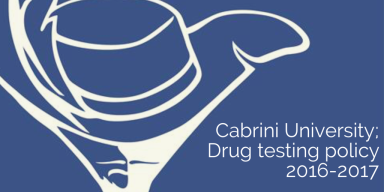Video by Ashley Sierzega and Hailey McDonough

According to the NCAA student-athlete substance use study, ‘Of the student-athletes surveyed, 9% reported using ADHD medication without a prescription.’
Cabrini University recently instated a new drug testing policy. This drug test is mandatory for all student-athletes. It is conducted randomly.
According to the Cabrini University athletic directory, “Student-athletes will be selected for testing throughout the academic year using a random system from the rosters of all athletic teams, in or out of season. The randomly selected student-athletes will be required to provide a urine sample under the strict supervision of personnel selected by the Director of Athletics. The student-athlete may have a witness accompany him/her to the testing to certify identification and to monitor the proceedings. Each specimen will be sealed under the observation of the student-athlete and witness.”
“I like the fact that we are doing drug testing. I think it helps to ensure that all of us athletes are on top of our game,” Anne-Marie Jones, junior volleyball player, said.
The test itself is looking for, but is not limited to, finding these banned substances; Methamphetamine, cocaine, marijuana, ecstasy, opiates, benzodiazepines, oxycodone and more.
“I think it [the new policy] holds athletes to a higher standard and it will make our athletics stronger and better,” Brooke Hagan, junior swimmer, said.
Also, according to the Cabrini University athletic directory, “A student-athlete may be subject to testing at any time when, in the judgment of Athletic Director and the program administrator, reasonable cause exists to suspect the student is engaging in the use of any drugs prohibited by this policy.” A coach would become suspicious if a student portrayed the following; poor motivation, unexplained absences, red eyes, appears hyper, and so on.
“I think it is absolutely in the best interest of our student-athletes to promote a drug-free environment,” Carol White, Cabrini women’s head tennis coach, said.
If a student-athlete is tested and is found positive, the first offense is that the student must attend mandatory counseling sessions immediately and suspended for seven days.
If it happens a second time, the student must again attend mandatory counseling sessions immediately (for multiple times during that week), an additional seven-day suspension as well as an automatic retest during the next drug testing session upon reinstatement.
If caught a third time, they must attend mandatory counseling sessions immediately (multiple times during that week), suspension from the team for one calendar year, as well as automatically being retested for the next drug testing session.
Finally, on the fourth offense, “a student-athlete who has four positive tests during his/her athletics career at Cabrini University will be immediately and permanently dismissed from all teams on which the Student-Athlete participates and be ineligible for any future intercollegiate athletic participation.”
“It can be flustering to people who do drugs frequently, but honestly that’s the sacrifice that you have to make if you are wanting to compete at the collegiate level here at Cabrini. If you don’t like it, don’t play,” Jones said.


